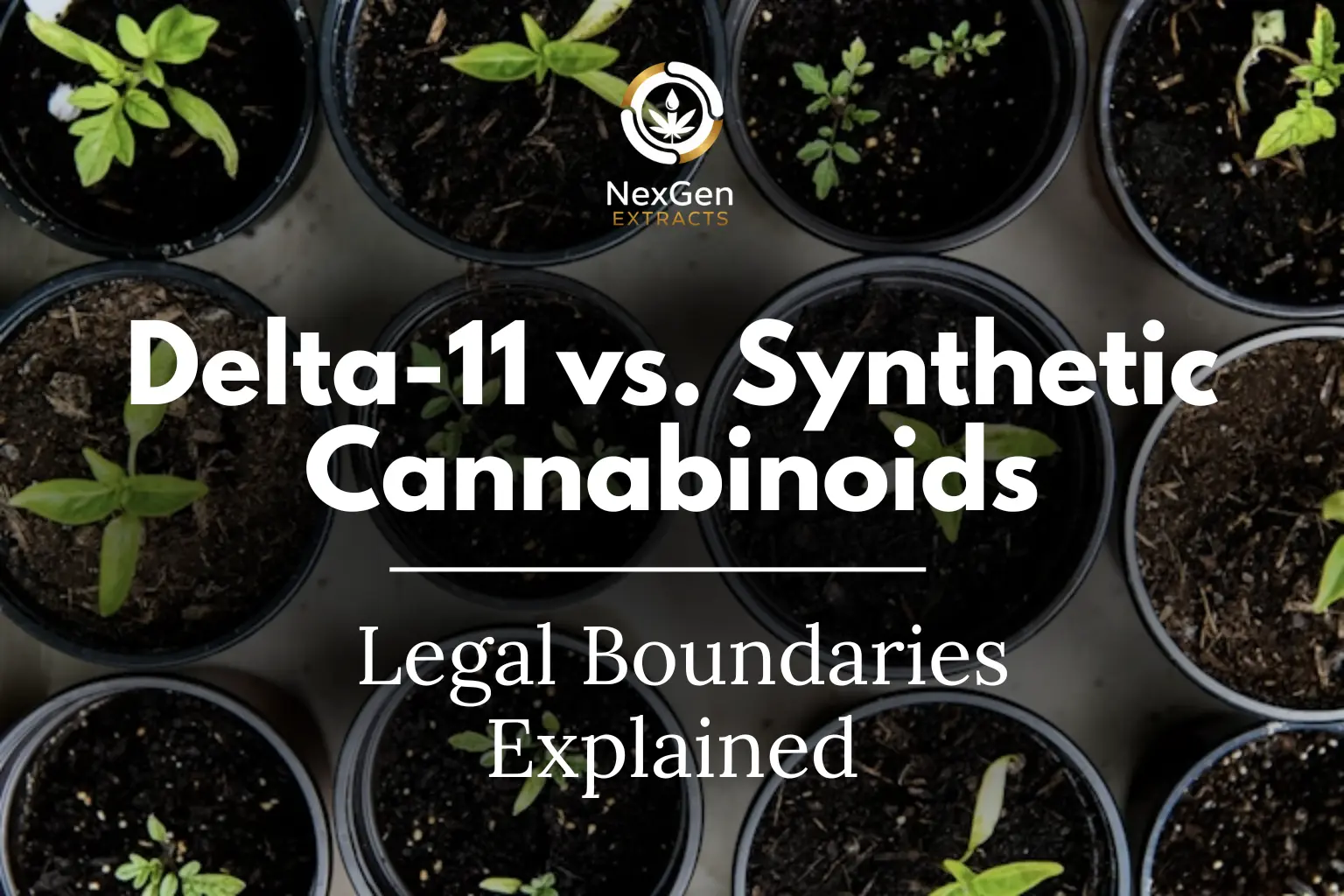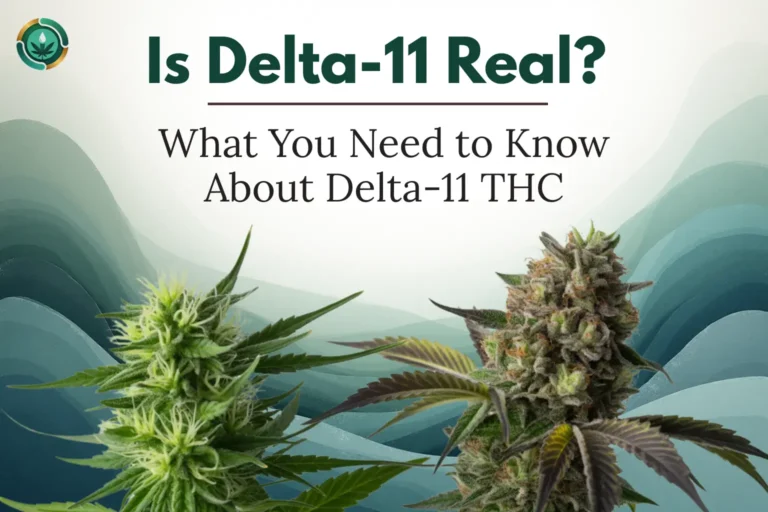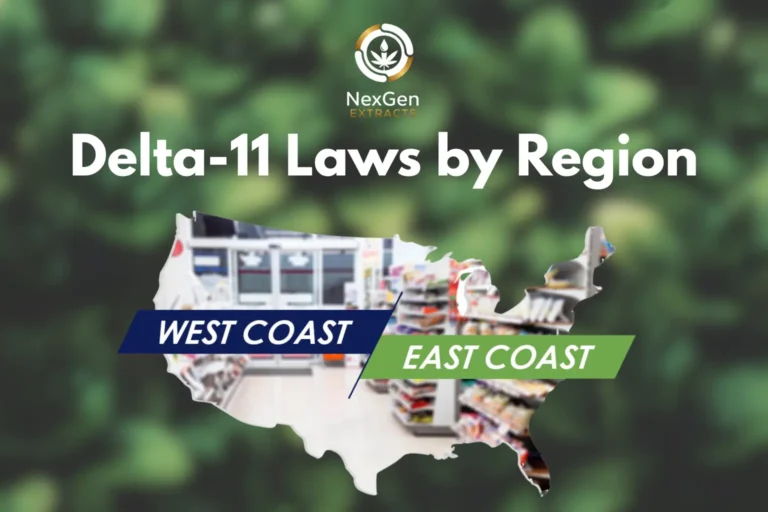
Introduction
The hemp industry is evolving fast, and new cannabinoids appear almost every year. One of the most talked-about ones today is Delta-11 THC. It’s gaining popularity for its smooth, uplifting effects — yet many people still confuse it with synthetic cannabinoids.
While both can cause psychoactive effects, their origins, chemistry, and legal status are completely different. This guide breaks down everything you need to know about how Delta-11 fits into U.S. hemp laws and how it differs from synthetic cannabinoids legally and scientifically.
What Exactly Is Delta-11 THC?
Delta-11 THC (or Δ11-THC) is a natural cannabinoid that exists in the hemp and cannabis plants in very small amounts. It’s a structural isomer of Delta-9 THC — the main psychoactive compound in cannabis — but it interacts with the body’s endocannabinoid system slightly differently.
When taken in controlled doses, Delta-11 may deliver a relaxing, euphoric effect similar to Delta-8 or Delta-9 but often milder. Most commercial Delta-11 products are hemp-derived, created by converting other cannabinoids like CBD or Delta-8 through a safe chemical process.
Because it comes from hemp containing less than 0.3% Delta-9 THC (by dry weight), it technically qualifies as federally legal under the 2018 Farm Bill.
How Delta-11 Is Made
Although Delta-11 naturally occurs in the hemp plant, it’s present in extremely low concentrations. Extracting it directly from hemp is not practical on a large scale.
Instead, manufacturers use isomerization, a lab process that rearranges the molecular structure of CBD or Delta-8 molecules to create Delta-11. The final result is chemically identical to the Delta-11 found naturally in hemp — meaning it’s still considered hemp-derived, not synthetic.
This distinction is crucial because legality often depends on whether a cannabinoid is hemp-derived or purely synthetic.
What Are Synthetic Cannabinoids?
Synthetic cannabinoids are lab-made compounds designed to mimic THC’s effects. They are not derived from the hemp plant at all. Instead, chemists manufacture them by combining various chemicals to interact with the body’s CB1 and CB2 receptors.
Unlike naturally occurring cannabinoids such as Delta-8, Delta-9, or Delta-11, these synthetic substances — often sold illegally under names like K2 or Spice — can be extremely potent and unpredictable. They have been linked to severe side effects, including anxiety, psychosis, heart complications, and even death in extreme cases.
In most jurisdictions, synthetic cannabinoids are strictly illegal and classified as Schedule I controlled substances.
Legal Background: The 2018 Farm Bill
To understand Delta-11’s legal status, we must start with the 2018 Farm Bill, which changed the cannabis landscape in the United States.
The bill defines hemp as any part of the Cannabis sativa plant — including cannabinoids and derivatives — containing no more than 0.3% Delta-9 THC on a dry-weight basis. Anything above that threshold qualifies as marijuana, which remains federally illegal.
Because Delta-11 can be derived from hemp and meet that 0.3% Delta-9 limit, it falls into a federal gray zone of legality. However, individual states have the power to make their own laws — and many have done exactly that.
Federal vs. State Laws on Delta-11
At the federal level, hemp-derived Delta-11 is technically legal, provided the Delta-9 concentration is within the legal limit. But states interpret and enforce hemp laws differently.
- Some states have fully legalized hemp-derived THC isomers, including Delta-8, Delta-10, and Delta-11.
- Others have banned or restricted all psychoactive cannabinoids, regardless of their hemp origin.
- A few states apply broad “THC analog” laws, which automatically make new isomers like Delta-11 illegal.
The Federal Analogue Act also complicates matters. It allows authorities to treat any compound “substantially similar” to a controlled substance as illegal if intended for human use. Although this act hasn’t yet been tested specifically on Delta-11, it could apply in the future.
How Delta-11 Differs from Synthetic Cannabinoids
Delta-11 and synthetic cannabinoids may seem similar at first, but their origins and legal treatment are worlds apart. Delta-11 THC is a naturally occurring compound found in hemp. It can also be produced from hemp-derived cannabinoids like CBD or Delta-8 through safe conversion processes. In contrast, synthetic cannabinoids are entirely man-made chemicals created in laboratories without any plant origin.
Legally, this difference is crucial. Delta-11 products remain federally legal under the 2018 Farm Bill, provided they contain less than 0.3% Delta-9 THC on a dry-weight basis. Synthetic cannabinoids, however, fall under the Controlled Substances Act and are classified as Schedule I drugs, making them illegal to produce, sell, or possess.
From a regulatory standpoint, Delta-11 is part of the hemp industry, which requires lab testing, COAs (Certificates of Analysis), and accurate labeling to ensure compliance and safety. Synthetic cannabinoids have no such oversight, often being sold on the black market without testing or quality control.
When it comes to effects, Delta-11 delivers a mild, balanced high — smoother than Delta-9 but more noticeable than Delta-8. Synthetic cannabinoids, on the other hand, can cause unpredictable and dangerous reactions, sometimes leading to severe health complications. In short, Delta-11 offers a controlled, plant-based experience, while synthetic cannabinoids carry serious legal and health risks due to their unstable and unregulated nature.
Why Delta-11 Isn’t Classified as Synthetic
The term “synthetic” usually refers to cannabinoids made without any hemp origin, using entirely artificial ingredients. Delta-11, on the other hand, starts from naturally derived hemp compounds like CBD.
Even if converted in a lab, the final molecule is identical to the natural version found in hemp. Therefore, it’s generally categorized as hemp-derived, not synthetic.
However, some state regulators still group all chemically converted cannabinoids as “synthetic,” even if they start from hemp. This gray area continues to spark debate between hemp producers and lawmakers.
Why Synthetic Cannabinoids Are Illegal
Synthetic cannabinoids gained attention in the 2010s after being sold in smoke shops as “legal highs.” Marketed as safe cannabis alternatives, they caused thousands of hospitalizations and multiple deaths.
Because these substances were never approved for human use and had no plant origin, the DEA and FDA classified them as illegal controlled substances. Their unpredictable potency and toxicity created major public-health risks.
In contrast, hemp-derived cannabinoids like Delta-11 are subject to lab testing, potency verification, and quality control, giving consumers safer, traceable options.
State-by-State Variations
Delta-11’s legality depends on where you live. Some states — such as Florida, Illinois, and Texas — allow hemp-derived cannabinoids as long as they comply with Delta-9 THC limits.
Other states, including Colorado, Alaska, and Vermont, prohibit the chemical conversion of cannabinoids. That means Delta-11 created from CBD may be treated as illegal.
Meanwhile, states like Delaware, Idaho, and North Dakota have banned all forms of THC, regardless of source. In those states, Delta-11 is not legal.
This patchwork of rules means both brands and consumers must stay updated on local legislation before buying or selling Delta-11 products.
How to Stay Legally Compliant
If you’re a consumer, follow these steps before purchasing any Delta-11 product:
- Check the Certificate of Analysis (COA). It should confirm that Delta-9 THC is under 0.3% and verify Delta-11 content.
- Confirm hemp origin. Only buy products clearly labeled “hemp-derived.”
- Research your state law. Some states may ban or restrict Delta-11.
- Avoid products with unclear ingredients. If the label doesn’t specify its source, skip it.
For brands and manufacturers, compliance means transparent production, proper testing, and accurate labeling. Make sure every product batch includes verified third-party testing and COAs available to customers.
Safety Considerations for Consumers
While hemp-derived Delta-11 is generally considered safe when tested properly, poor-quality products can pose risks. Always choose brands that use CO2 or ethanol extraction, maintain clean manufacturing facilities, and avoid harsh chemical solvents.
Synthetic cannabinoids, on the other hand, often contain unknown additives and contaminants. Their lack of regulation and unpredictable potency make them dangerous and illegal.
Future Outlook: Regulation Is Coming
The hemp industry’s rapid growth has outpaced legislation. Regulators are now moving to clarify the difference between hemp-derived THC isomers like Delta-11 and truly synthetic cannabinoids.
In the near future, federal agencies may tighten the legal definition of hemp to include only naturally occurring cannabinoids, excluding those created through conversion. States may also introduce stricter testing, labeling, and licensing rules for psychoactive hemp products.
Still, many experts believe hemp-derived cannabinoids like Delta-11 have a secure place in the wellness market, especially when produced transparently and responsibly.
Why Understanding the Difference Matters
Knowing the distinction between Delta-11 THC and synthetic cannabinoids isn’t just about legality — it’s about consumer safety and trust.
- Delta-11 comes from hemp, is lab-tested, and falls under existing hemp regulations.
- Synthetic cannabinoids are lab-made chemicals that can harm users and carry criminal penalties.
By choosing verified hemp-derived Delta-11 products, consumers can enjoy natural benefits without crossing legal boundaries.
Final Thoughts
The line between natural and synthetic cannabinoids can be confusing — but it’s vital to understand it. Delta-11 THC represents the next step in hemp innovation, offering consumers an enjoyable experience while staying (for now) within federal law.
Synthetic cannabinoids, in contrast, remain unsafe, unpredictable, and fully illegal.
If you’re exploring cannabinoids for wellness, always go with trusted brands that provide full transparency, COAs, and clear hemp sourcing. At NexGen Extracts, we support science-driven, law-compliant hemp innovation — ensuring safety, quality, and authenticity in every product.


